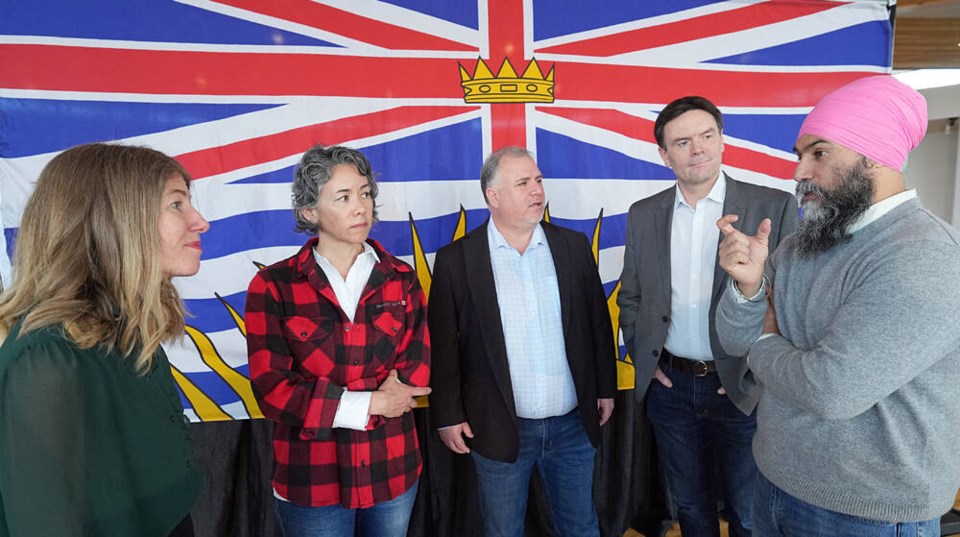If the NDP is going to rebuild after a difficult federal election campaign, it needs to work on its messaging, according to the lone NDP candidate who held onto a Vancouver Island riding.
Gord Johns, who retained his Courtenay-Alberni seat with 39.6% of the vote, defeating Conservative challenger Kris McNichol — who got 34.6 per cent — said the party’s message just didn’t seem to resonate with voters.
“We saw the Conservatives with slogans they couldn’t even explain,” Johns said Tuesday, the day after the election. “They’re resonating with voters, yet they’re not backed up with any sort of policy or supported by experts or evidence-based policies.”
Johns said it’s frustrating when he sees people struggling with the cost of living while big business, big oil, big banks, big grocery stores and big telecommunication companies have record profits and large real estate conglomerates are buying up residential housing.
“You’ll never hear a Conservative call out the corporate greed,” he said, noting the Liberals don’t do it, either. “But these issues are critical and New Democrats are there to actually talk about solutions and policies that are needed to protect people at this very critical time.
“So we’ve got to do better at our messaging, that’s something that I saw.”
Political scientist Dan Reeve isn’t sure better messaging or even better strategy would have made a difference in this election.
The Camosun College instructor said the election became about who could handle the U.S. and President Donald Trump, which turned the focus toward the two larger parties — the Liberals and Conservatives.
Of the six Island ridings that had been held by the NDP when the campaign started, only one remained orange after the polls closed, but Reeve said that was not a rebuke of New Democrats.
“I think a lot of people I know who would traditionally vote NDP were kind of tactically voting,” he said.
“It’s definitely a humbling day for the NDP and a difficult day for them. But on the other hand, in the context of what’s going on in the U.S., in the context of what the election was really about, in some ways, that was bigger and out of their hands.”
Reeve said he doesn’t know what else the NDP could have done, noting at the start of the campaign, leader Jagmeet Singh was claiming to be running for prime minister, but that changed halfway through when the party realized it was not part of that discussion and instead started to urge people to vote NDP to stop the Conservatives
“I don’t take that [switch] as the strategic blunder that cost them,” Reeve said. “The hard part was the campaign had a real national flavour, and that national flavour really was a kind of a fear of American MAGA-style politics that some Conservatives seemed partial to and the fear that that would take over Canada. So I think people who don’t normally vote Liberal voted Liberal.”
NDP strategist Tim Chu agreed the question at the ballot box centred around the fear of Trump.
“We did hear quite a bit of people on the doorstep who said: ‘You know, this one election … I’m going to vote Liberal. But I do fundamentally believe in everything that the NDP is fighting for.’ ”
It was difficult in the context of a trade war with the United States to break through with voters on issues where the NDP performs well, but the party tried to stress protection for workers affected by trade issues, Chu said.
NDP incumbent Laurel Collins, who lost her Victoria seat to Liberal Will Greaves, said on election night that she wished Canada’s electoral system was “a little bit more sophisticated than forcing people to feel like they need to choose between heads and tails as a country, so we could stand up to a fascist bully while still addressing the huge crises we’re facing as a country.”
Johns agreed, noting in the mid- and North Island, it wasn’t Conservatives who defeated the NDP candidates, it was progressive voters splitting the vote.
“That led to Conservatives winning seats,” he said, noting in his riding, a poll was released mid-campaign that showed Johns in third place, which he believes had an impact and may have taken from his vote count. “It caused harm because people wanted to stop Conservatives here.”
Reeve said the election results in the North Island suggest the NDP may have bigger problems.
“I think the scary part for the NDP isn’t that they lost 10% to the Liberals, it’s that they also bled a bit to the Conservatives,” he said. “And ideologically that’s a big jump.
“What is it about that [Conservative] messaging that many people on the left find abhorrent, but some people are finding appealing? To me, that’s the crux of the challenge for the NDP in terms of re-establishing their broad base.”
— With files from Roxanne Egan-Elliott



